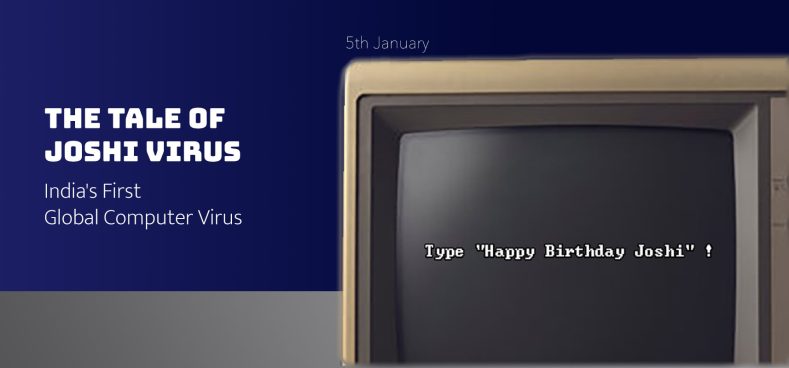5th January and The Tale of Joshi Virus: India’s First Global Computer Virus

In the cinematic tapestry of cybersecurity, where tales of intrigue and innovation collide, one story emerges from the shadows of the past. It’s a story that began in the early 1990s, during the DOS era, when computer viruses were still a novel and mysterious menace. This is the tale of Joshi, a virus of Indian origin that defied borders and spread across continents, carving its name into the annals of cyber history.
Picture this: it’s June 1990. Computers are clunky, floppy disks are the lifeline of data, and the concept of a “virus” infecting a machine is still catching the world off guard. Amidst this backdrop, a boot sector virus emerges, stealthy and cunning, infecting the Master Boot Sector of hard drives and the boot sectors of floppy disks. Its name? Joshi.
Unlike the malevolent viruses that would come to dominate headlines in later decades, Joshi was more mischievous than malicious. It carried a curious payload — one that turned an ordinary day into a moment of bemusement. Every January 5th, upon booting up an infected computer, users were greeted by a message: “Type ‘Happy Birthday Joshi!'” The screen froze, leaving users no choice but to comply. Only after typing the phrase did the computer’s boot process resume, as if Joshi had simply demanded its annual tribute.
But Joshi was no simple prank. It was a masterclass in stealth, a magician’s sleight of hand. Once loaded into a computer’s memory, it deployed a series of clever tricks to hide itself from detection. It intercepted key system functions like INT 8, INT 9, INT 13, and INT 21, ensuring that utilities like Norton Utilities displayed a clean boot sector, concealing the infection.
On floppy disks, it formatted an extra track at the end of the disk, storing its own code and the original boot sector there, ready to spring into action. This often caused the floppy drive to make a strange noise as the magnetic heads moved back and forth while booting from floppy, trying to read the extra formatted track at the end of the floppy.
I remember how just listening to the sound of the head moving to and fro, I used to guess that the floppy was already infected by Joshi virus. This virus needed sharing of floppy disks from one PC to another to spread. Even with this limitation, the stealth nature of the virus and its smooth functioning allowed it to spread from India and across continents into Europe and the US.
I still don’t remember any other virus originating from India and spreading globally to reach The WildList. As a young college student pursuing my graduation, I encountered Joshi during its reign of mischief. Reverse engineering this virus was nothing short of a revelation. I remember being both amazed and intrigued by its techniques — the way it reduced available memory by 6 KB to make space for itself, the precision with which it checked for its presence in memory before activating, and its persistence in surviving even a warm boot (Ctrl-Alt-Del).
It was a formidable adversary, and understanding its mechanics felt like unraveling a mystery. Back then, cleaning Joshi from an infected PC was no small feat. Without tools like Norton Utilities, it often required a complete format of the infected hard drive. Only those with a deep understanding of how master boot sector code worked could hope to manually dislodge it.
The origins of Joshi remain shrouded in speculation. Some believed it emerged from Mumbai or Gujarat, while others whispered that Pune was its birthplace. Wherever it originated, Joshi quickly outgrew its local roots, spreading like wildfire across Europe and Asia, leaving its mark on an unsuspecting world. I was surprised to find that a quick internet search about any major virus or malware from India that spread worldwide doesn’t give the right answer. The name of this virus isn’t even mentioned in lists of viruses from India that went global. But the truth is, as far as I know, no other virus from India has spread to as many countries as the Joshi virus.
Though I would have loved to delve deeper into the technical strengths and details of how this virus infected hard disks and managed to remain active even after a warm boot of PC, I’ve tried to keep this article accessible to everyone. Today, Joshi’s story stands as a testament to an era of exploration and discovery in the realm of cybersecurity. For me, it’s more than a piece of history; it’s a memory of a time when curiosity and ingenuity defined the battle against these digital intruders.
The techniques Joshi employed were ahead of their time, and while its antics were relatively harmless, its legacy as India’s first global computer virus endures.
So, the next time you find yourself typing “Happy Birthday” for a loved one, spare a thought for Joshi — the mischievous piece of Indian cyber history that made an entire generation of users do just that.
#JoshiVirus #IndiasFirstComputerVirus #CyberSecurity #ComputerVirus #Malware #CyberHistory #RetroTech #VintageComputing #IndianCyberHistory #TechNostalgia #ComputerSecurity #VirusAnniversary #January5th #HappyBirthdayJoshi #BootVirus #MBR

No Comments, Be The First!